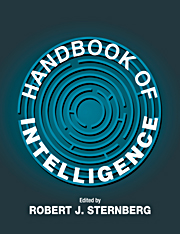Book contents
- Frontmatter
- Contents
- Preface
- Contributors
- PART I THE NATURE OF INTELLIGENCE AND ITS MEASUREMENT
- PART II DEVELOPMENT OF INTELLIGENCE
- PART III GROUP ANALYSES OF INTELLIGENCE
- PART IV BIOLOGY OF INTELLIGENCE
- PART V INTELLIGENCE AND INFORMATION PROCESSING
- PART VI KINDS OF INTELLIGENCE
- PART VII TESTING AND TEACHING INTELLIGENCE
- 19 Psychometric Approaches to Understanding and Measuring Intelligence
- 20 Tests of Intelligence
- 21 Interpretation of Intelligence Test Scores
- 22 Teaching Intelligence: A Performance Conception
- PART VIII INTELLIGENCE, SOCIETY, AND CULTURE
- PART IX INTELLIGENCE IN RELATION TO ALLIED CONSTRUCTS
- Author Index
- Subject Index
21 - Interpretation of Intelligence Test Scores
Published online by Cambridge University Press: 05 June 2012
- Frontmatter
- Contents
- Preface
- Contributors
- PART I THE NATURE OF INTELLIGENCE AND ITS MEASUREMENT
- PART II DEVELOPMENT OF INTELLIGENCE
- PART III GROUP ANALYSES OF INTELLIGENCE
- PART IV BIOLOGY OF INTELLIGENCE
- PART V INTELLIGENCE AND INFORMATION PROCESSING
- PART VI KINDS OF INTELLIGENCE
- PART VII TESTING AND TEACHING INTELLIGENCE
- 19 Psychometric Approaches to Understanding and Measuring Intelligence
- 20 Tests of Intelligence
- 21 Interpretation of Intelligence Test Scores
- 22 Teaching Intelligence: A Performance Conception
- PART VIII INTELLIGENCE, SOCIETY, AND CULTURE
- PART IX INTELLIGENCE IN RELATION TO ALLIED CONSTRUCTS
- Author Index
- Subject Index
Summary
Three fundamental questions in interpretating intelligence test batteries are the following:
What abilities underlie performance on the various scales?
How well do the scales measure those underlying abilities?
How can reliable information about those abilities be extracted from the test results?
This chapter considers how these questions may be addressed, without attempting to answer them for particular instruments.
One broad purpose of interpretation is to gain an understanding of the examinee's cognitive strengths and weaknesses; this requires focusing on the intelligence tests themselves and their theoretical underpinnings. For the purpose of understanding, a test score is interpretable only if it has a clear relationship to a meaningful construct. A second purpose of interpretation is prediction, such as of occupational or educational success, or of the likelihood that particular interventions will be effective (“treatment validity”).
This chapter will focus on the first purpose, interpreting for understanding. Many psychologists consider such understanding to be helpful, if not essential, to their ability to serve a client effectively (Keith, 1994), although empirical demonstrations of the value of this understanding are rare (Reschly, 1997). Diagnosis is a particular form of understanding.
WHAT DO INTELLIGENCE TESTS MEASURE?
The question of what an intelligence battery measures can be addressed only with reference to a model of intelligence. The two dominant models underlying currently available intelligence tests are the hierarchical psychometric abilities model and the Das–Luria neuropsychological model.
Information
- Type
- Chapter
- Information
- Handbook of Intelligence , pp. 477 - 491Publisher: Cambridge University PressPrint publication year: 2000
Accessibility standard: Unknown
Why this information is here
This section outlines the accessibility features of this content - including support for screen readers, full keyboard navigation and high-contrast display options. This may not be relevant for you.Accessibility Information
- 3
- Cited by
